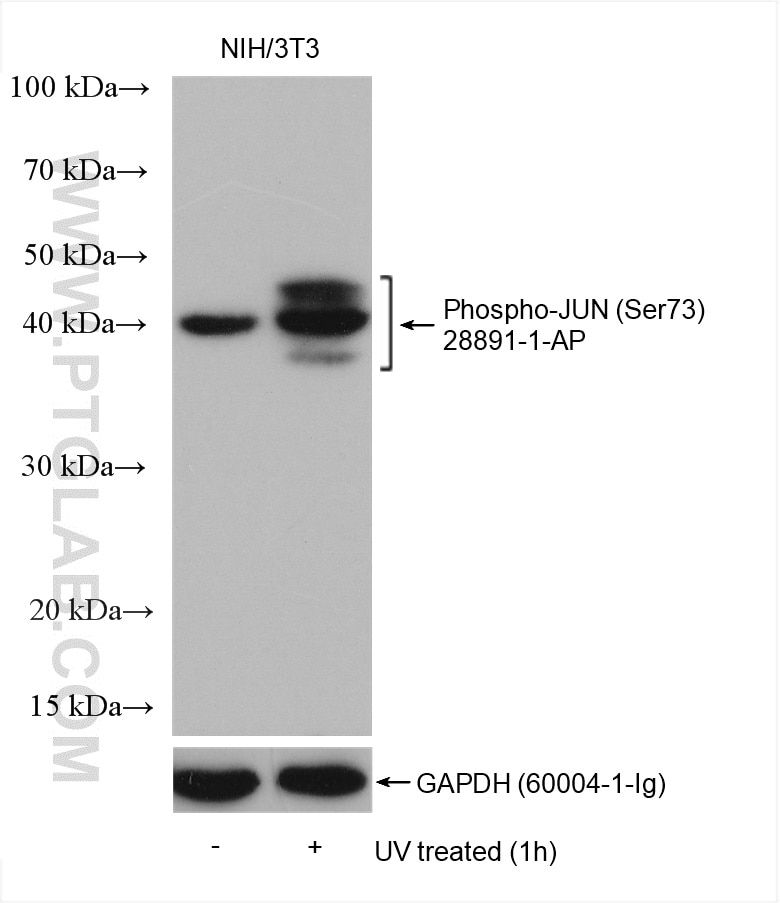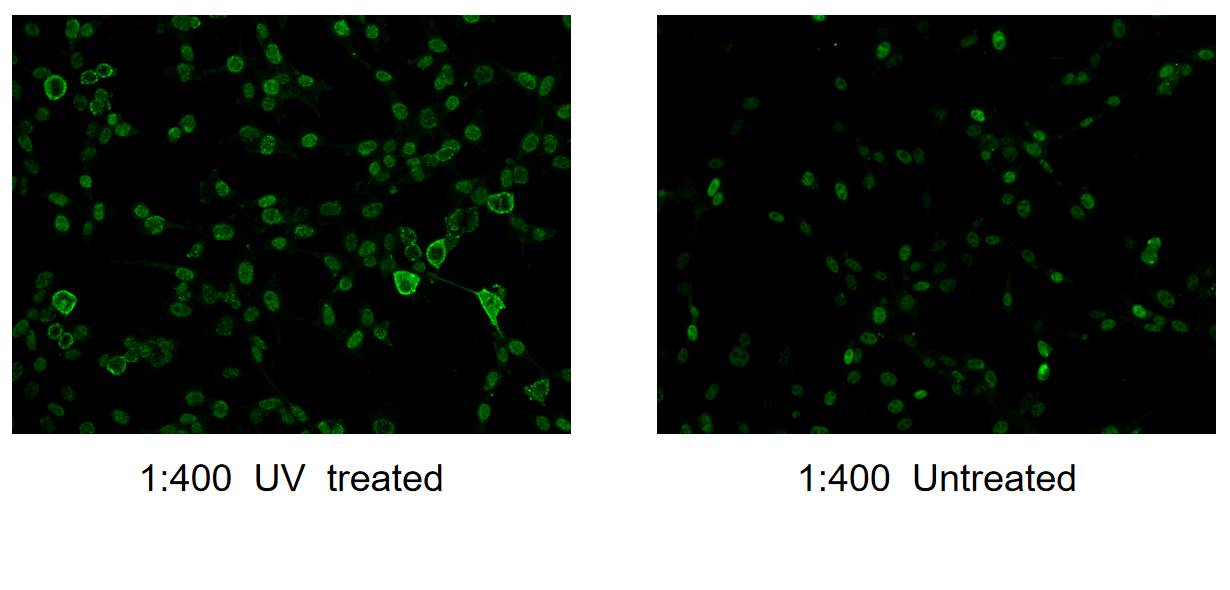Tested Applications
| Positive WB detected in | UV treated NIH/3T3 cells |
| Positive IF/ICC detected in | NIH/3T3 cells |
Recommended dilution
| Application | Dilution |
|---|---|
| Western Blot (WB) | WB : 1:500-1:2000 |
| Immunofluorescence (IF)/ICC | IF/ICC : 1:200-1:800 |
| It is recommended that this reagent should be titrated in each testing system to obtain optimal results. | |
| Sample-dependent, Check data in validation data gallery. | |
Published Applications
| WB | See 27 publications below |
| IF | See 4 publications below |
| CoIP | See 1 publications below |
Product Information
28891-1-AP targets Phospho-JUN (Ser73) in WB, IF/ICC, CoIP, ELISA applications and shows reactivity with Human, mouse, rat samples.
| Tested Reactivity | Human, mouse, rat |
| Cited Reactivity | human, mouse, pig |
| Host / Isotype | Rabbit / IgG |
| Class | Polyclonal |
| Type | Antibody |
| Immunogen |
Peptide Predict reactive species |
| Full Name | jun oncogene |
| Calculated Molecular Weight | 331 aa, 36 kDa |
| Observed Molecular Weight | 38-45 kDa |
| GenBank Accession Number | BC068522 |
| Gene Symbol | JUN |
| Gene ID (NCBI) | 3725 |
| RRID | AB_2881228 |
| Conjugate | Unconjugated |
| Form | Liquid |
| Purification Method | Antigen affinity purification |
| UNIPROT ID | P05412 |
| Storage Buffer | PBS with 0.02% sodium azide and 50% glycerol, pH 7.3. |
| Storage Conditions | Store at -20°C. Stable for one year after shipment. Aliquoting is unnecessary for -20oC storage. 20ul sizes contain 0.1% BSA. |
Background Information
JUN is also named as c-Jun and AP1, belongs to the bZIP family and Jun subfamily. JUN, the most extensively studied protein of the activator protein-1 (AP-1) complex, is involved in numerous cell activities, such as proliferation, apoptosis, survival, tumorigenesis and tissue morphogenesis (PMID: 22180088). JUN is a transcription factor that recognizes and binds to the enhancer heptamer motif 5'-TGA[CG]TCA-3'. It promotes activity of NR5A1 when phosphorylated by HIPK3 leading to increased steroidogenic gene expression upon cAMP signaling pathway stimulation. JUN is a basic leucine zipper (bZIP) transcription factor that acts as homo- or heterodimer, binding to DNA and regulating gene transcription (PMID: 9732876). In additon, extracellular signals can induce post-translational modifications of JUN, resulting in altered transcriptional activity and target gene expression (PMID:8464713). More over, it has uncovered multiple layers of a complex regulatory scheme in which JUN is able to crosstalk, amplify and integrate different signals for tissue development and disease. Jun is predominantly nuclear, ubiquitinated Jun colocalizes with lysosomal proteins (PMID: 15469925). This antibody is raised against synthetic phosphopeptide corresponding to residues surrounding Ser73 of human JUN, which can detect the bands around 42-45 kDa.
Protocols
| Product Specific Protocols | |
|---|---|
| IF protocol for Phospho-JUN (Ser73) antibody 28891-1-AP | Download protocol |
| WB protocol for Phospho-JUN (Ser73) antibody 28891-1-AP | Download protocol |
| Standard Protocols | |
|---|---|
| Click here to view our Standard Protocols |
Publications
| Species | Application | Title |
|---|---|---|
Small Honeycomb Bionic Graphene Oxide Quantum Dot/Layered Double Hydroxide Composite Nanocoating Promotes Osteoporotic Bone Regeneration via Activating Mitophagy | ||
J Cell Biol JNK regulates ciliogenesis through the interflagellar transport complex and actin networks | ||
J Cell Mol Med SIAH2 suppresses c-JUN pathway by promoting the polyubiquitination and degradation of HBx in hepatocellular carcinoma | ||
Biochem Pharmacol Activation of CXCL13/CXCR5 axis aggravates experimental autoimmune cystitis and interstitial cystitis/bladder pain syndrome. | ||
Int J Biol Sci RHOV promotes lung adenocarcinoma cell growth and metastasis through JNK/c-Jun pathway. | ||
Front Pharmacol Azithromycin Attenuates Bleomycin-Induced Pulmonary Fibrosis Partly by Inhibiting the Expression of LOX and LOXL-2. |






